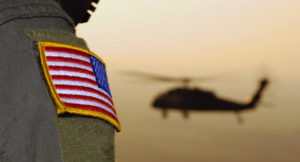by WorldTribune Staff, February 16, 2017
The Pentagon is conducting a “30-day review” of its strategy in Syria and is floating the idea of sending in ground troops.
U.S. commanders have said there is an urgent need to liberate Raqqa, the de facto capital of Islamic State (ISIS). Intelligence has indicated ISIS jihadists in Raqqa are actively plotting attacks on the U.S. and its allies in the Middle East and Europe.

The deployment of ground forces, would have to be approved by President Donald Trump, but the commander in chief has already directed military leaders to fast track plans for defeating the terror group and, according to White House documents leaked to the media late last month.
Trump has also expressed a willingness to expand the United States’ presence in Syria.
“We are in the process of conducting our 30-day review of the strategy to defeat ISIS as directed by the president,” said Navy Capt. Jeff Davis, a Pentagon spokesman.
“We are considering a number of measures to accelerate the campaign as part of that review, but no decisions have been made.”
Defense Secretary James Mattis is “actively engaged with his combatant commanders and commanders on the ground to listen to their recommendations and to provide them with the resources and authorities they need to hasten the defeat of ISIS,” Davis said.
A spokesman for U.S. Central Command, which oversees the campaign against ISIS in Syria and Iraq, told Military Times that no deployment announcements are imminent.
However, multiple U.S. Army sources told Military Times that about 2,000 soldiers with the 82nd Airborne Division’s 2nd Brigade Combat Team soon may bolster other Army elements already in the region. Currently, about 1,800 paratroopers from the 2nd BCT are in Iraq participating in the U.S. military’s train-and-advise mission. The 82nd Airborne Division is based at Fort Bragg in North Carolina.
“Any large-scale deployment of conventional U.S. military forces would represent a marked departure from the strategy advocated by Trump’s predecessor, former President Barack Obama, who hoped instead to rely on small special forces teams to train and advise the patchwork of militias with a stake in the militant group’s defeat,” Military Times said.
The White House also indicated last month that it could task the military with establishing “safe zones” in Syria for the estimated 11 million refugees who’ve been forced from their homes by the ongoing violence.
